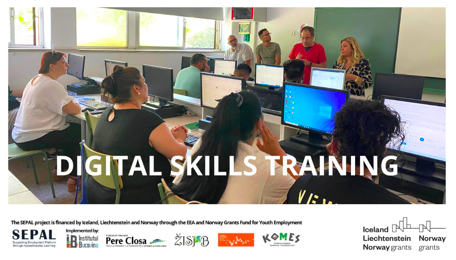The Digital Economy and Society Index shows that 4 out of 10 adults and every third person who works in Europe lacks basic digital skills. In addition, already in 2021, 28 occupations ranging from construction and healthcare to engineering and IT had shortages, showing a growing demand for both high and low-skilled workers[1].
There is also low representation of women in tech-related professions and studies, with only 1 in 6 IT specialists and 1 in 3 STEM graduates being women.
To encourage lifelong learning, Member States have endorsed the EU 2030 social targets that at least 60% of adults should participate in training every year, already presenting their national contribution to meeting this target.
This is also important to reach the employment rate target of at least 78% by 2030. The 2030 Digital Compass sets the EU target that by 2030, at least 80% of all adults should have basic digital skills, and there should be 20 million employed ICT specialists in the EU, while more women should be encouraged to take up such jobs.
Furthermore, during the investigation and work with youngsters in need, within the framework of the European project SEPAL (2018-2021), one of the most important causes of high rate in unemployment among youngsters was related with to the lack of basic digital skills. Based on these necessities, we approached to offer courses related with digital skills, in collaboration with CFA Morena Pomar. At the end of the training, the youngsters were certified on their basic digital skills known in Catalonia as ACTIC certification.
As consortium of SEPAL (Rumania, Spain, Lithuania, Greece and Poland), as part of the evaluation indicators of the project we conducted sustainable plans to follow up with the SEPAL PRO project (2022 – 2024) and it was decided to be persistent on raising the basic capacities and improve the soft and digital skills of our NEETs.
Precisely, the European Parliament and of the council announced by President von der Leyen the 2023 European Year of Skills, represents a unique opportunity to support European companies, and especially small and medium-sized enterprises, “grappling with a shortage of staff” by putting “more focus in our investment on professional education and upskilling”, by ensuring “better cooperation with companies”, by matching companies’ needs “with people’s aspirations” of both low and high skilled, and by speeding up and facilitating the “recognition of qualifications also of third country nationals” (Proposal for a DECISION OF THE EUROPEAN PARLIAMENT AND OF THE COUNCIL on a European Year of Skills 2023) .
Following the same line, during 2023 at least 40 youngsters in vulnerable situations will receive training on ICT and soft skills to improve the social and labour insertion.
[1] https://digital-strategy.ec.europa.eu/en/policies/digital-skills-and-jobs
Enerida Isuf, Project Coordinator Sepal Pro Spain


